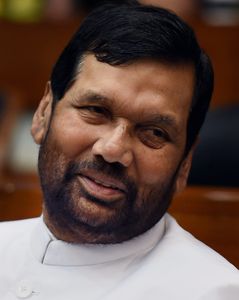Who is Ram? Where is Ram?
There was stunned silence in the Lok Sabha as Ram Vilas Paswan hurled this rhetorical poser during a debate in the 1990s.
As the house broke into pandemonium, Paswan delicately removed his spectacles, pointed its stem towards his heart, and said: “I am Ram—Ram Vilas Paswan.”
Before the BJP benches could catch on to what he was trying to say, Paswan continued: “Not just the name. There is the spirit of Ram in me; there is Ram in you; there is Ram in every Indian’s heart. Ram dwells in the hearts of all Indians— not just in your temples.”
There was desk-thumping from the left, the centre and even the mandir-right.
That was Ram Vilas Paswan—a man who practised combative politics, but carried a rounded personality. He made enemies in politics, but befriended them in personal life.
The country, the world and the Guinness Book took note of the young Lohia socialist when he, just out of an Emergency jail, won the largest majority from Hajipur. A decade later, Janata Dal’s V.P. Singh spotted a future prime minister in him, and gave him labour and welfare.
In welfare, the dalit from Bihar had a brahmin secretary from Kerala who believed passionately in dalit and backward empowerment. P.S. Krishnan prepared the historic note for VP and Paswan to discuss in the cabinet on August 6, 1990. That note, envisaging job quotas for the backwards, would radically change Indian politics. A new political elite would rise in the Gangetic Plain.
As Mandal shook the brahmin-thakur-dominated polity of the north, Paswan and Sharad Yadav stood like rocks behind VP. They went down fighting the BJP’s mandir with Mandal. However, as the Narasimha Rao-Manmohan Singh duo blunted the sting of Mandal by creating jobs in the non-Mandal economy, the Janata parivar fractured into pieces.
Yet, prime ministers and party chiefs sought out Paswan (in 2004, his long-time neighbour Sonia Gandhi walked into his house seeking an alliance), not just for his political clout, but for his administrative acumen. He had a computer-like brain that could absorb facts and figures, and reel them out without having to check his notes. This columnist remembers his incredible performance at his first presser held a day after he took charge of fertilisers and steel. For two hours he briefed us, without checking a single file or consulting an officer even once, on the performance, plans, problems, promises, profits and losses of every PSU under the two ministries.
Civil servants adored him. He addressed them with a ‘ji’, and rose to receive the seniors when they entered his chamber.
However, Paswan could not become the messiah of the dalits and the backwards, as VP had hoped. As he got sucked into the coalition politics of the 1990s, he became a political weathercock, aligning with the BJP first, then with the Congress and again with the BJP.
That was a problem with most caste-justice chieftains. As a political commentator said, none of them could ford the mighty stream of the Ganga. Most of them turned into warlords in their fiefs, and failed to cross the political Rubicon of the Ganga. If Mulayam Singh Yadav and Mayawati stayed put on its left bank, Lalu Prasad, Paswan and Nitish Kumar were confined to the right.
Tailpiece: Paswan’s two bids to strike roots in Uttar Pradesh came a cropper. He lost the 1985 Bijnor by-poll, to the Congress’s Meira Kumar. In 1987, the Guinness record-holder lost his deposit in the Haridwar by-poll finishing behind Ram Singh of the Congress and Mayawati of the BSP.
Sharad Yadav is perhaps the only Mandal neta who has won from several states—Madhya Pradesh, Bihar and Uttar Pradesh.


